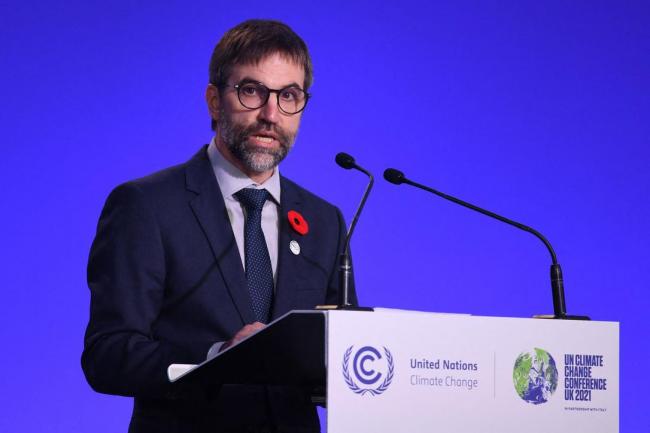Articles Menu

OTTAWA—Canada’s pledge to stop financing fossil fuel projects abroad doesn’t go far enough because it could still allow the government to support oil and gas production in other countries, environmentalists say.
Canada is one of 24 countries that has so far signed a joint commitment at the ongoing climate summit in Scotland to end “new direct” support for the fossil fuel sector outside its borders by the end of 2022. The pledge was applauded by climate activists who have pushed governments to stop using public dollars to support the production of emissions-heavy oil, gas and coal — energy sources that have fuelled the climate crisis that is now gripping the world.
But some environmentalists say the declaration has shortcomings, including that it only commits signatories to cut support for “unabated” fossil fuel production. That word represents a “loophole” that could allow public dollars to keep flowing to projects that offset emissions through carbon capture and storage technology, said Julia Levin, senior program manager of climate and energy for the organization Environmental Defence.
Many environmentalists are wary of carbon capture for oil and gas production because they argue it would allow for the continued extraction of emissions-heavy energy sources, even as leading scientists warn deep and rapid reductions in annual emissions are needed to restrain global warming to less damaging levels.undefined
“We don’t want this to be a loophole for huge amounts of money to go towards carbon capture projects that we know are false solutions that will just keep us dependent on oil and gas,” Levin said.
The declaration does not define what “unabated” means. A spokesperson for Environment Canada told the Star by email on Tuesday that the government is working on its own definition, but pointed out that a similar international initiative to phase out coal-fired power used the term “unabated” to refer to plants that don’t have mechanisms to capture or store emissions.
The spokesperson also said the government doesn’t yet know how much money will be cut off by the fulfilment of this pledge.
Catherine Abreu, founder and executive director of the non-profit organization Destination Zero, said the declaration has the potential to be “game changing” because it shows Canada and other wealthy countries like Germany, the United Kingdom and United States are starting to take steps to divert the flow of public dollars away from the fossil fuel sector.
At the same time, however, she agreed the commitment’s use of the term “unabated” leaves room for Canada and other countries to continue funding foreign fossil fuel projects that use technologies like carbon capture. This, she said, would be like “moving from one problem to another,” as the government could continue using public money to support the extraction of fossil fuels in other countries that would create planet-warming emissions when they are ultimately combusted.
A report published last month by groups including the United Nations Environment Program, for instance, concluded governments’ expected fossil fuel production in the coming years would cause global warming this century to blow past an increase of 1.5 C, the goal of the 2015 Paris Agreement to which Canada is a signatory.
Another issue with the declaration is that it is restricted to foreign fossil fuel projects, while the bulk of the billions of dollars in Canadian financing for oil and gas goes to domestic production, Abreu said. Export Development Canada (EDC), for example, provided $8.1 billion in support for the oil and gas sector last year. Roughly $800 million of that was direct financing to international fossil fuel companies and projects, the agency confirmed by email on Tuesday.
“Countries are still missing a big piece of the puzzle,” Abreu said.
Canada’s public financing of fossil fuels was a political issue in the federal election this summer, when the New Democratic Party attacked the Liberals for failing to eliminate subsidies for fossil fuel companies during their time in government. Ahead of COP this month, a report from a group called Oil Change International concluded G20 countries provided more than twice as much public money to fossil fuel projects than renewable energy from 2018 to 2020 — with Canada providing more financing to oil and gas companies than any other country in the report.
Most of that funding was through EDC, which is mandated to provide credit and business support to companies looking to grow in the international marketplace. But EDC says it is drawing down its annual financing for oil and gas companies, which decreased from $12.5 billion in 2018 to $8.1 billion last year. Figures provided by the agency show it provided $62 billion to the oil and gas sector from 2015 to 2020.
In a statement last week, the agency indicated it supports the government’s decision to sign the declaration and would stop “new direct” financing for international fossil fuel companies and their production. At the same time though, the agency said it would “continue to support” Canadian firms that work to help reduce emissions from foreign fossil fuel companies.
Environment Minister Steven Guilbeault told the Star last month that the government would craft a timeline to eliminate financing from Crown corporations like EDC, an agency that has provided $62 billion is support to oil and gas companies since 2015. The government has also pledged to eliminate all “inefficient” subsidies for oil and gas production by 2023.